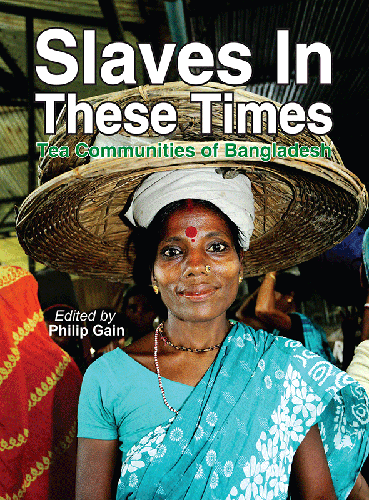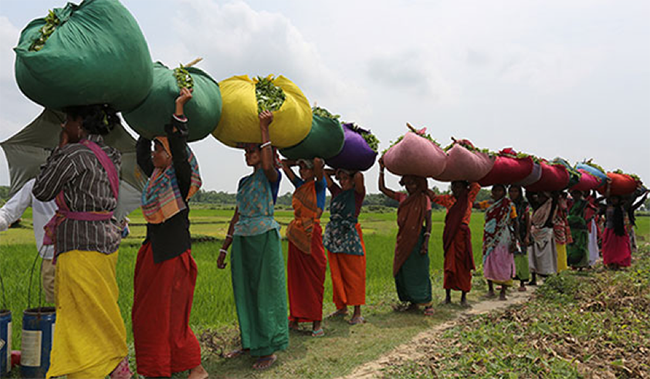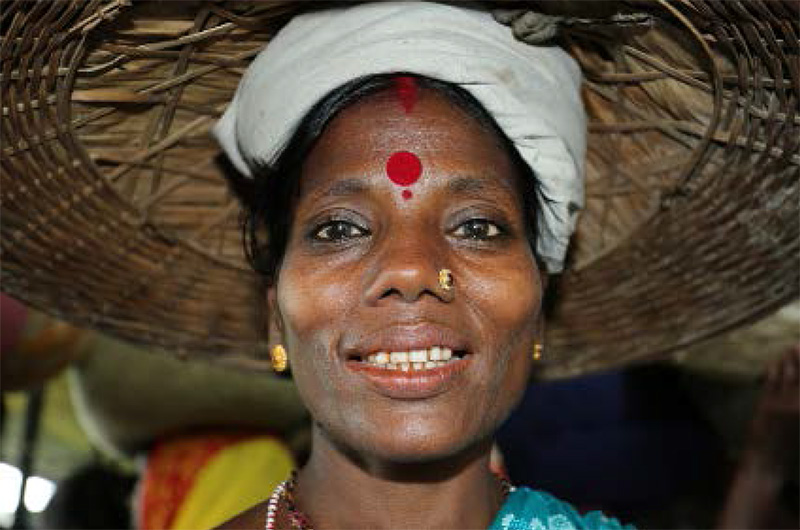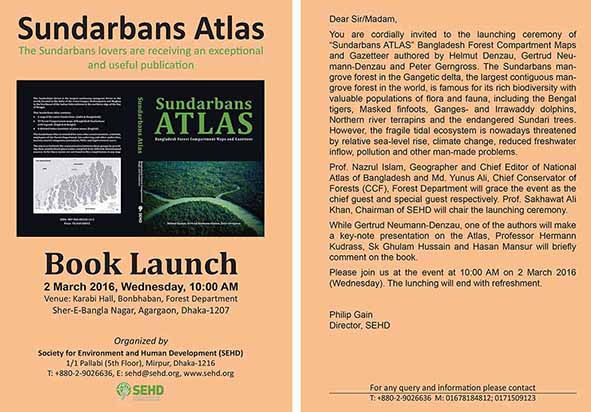On April 19, 2016, the Society for Environment and Human Development, an environmental and human rights organization, organized a citizen’s dialogue titled, “Rethinking Identity, Geography and Rights of the Tea Workers and their Community” in partnership with Gram Bikash Kendra with financial support from the European Union and ICCO Cooperation. The event brought together various stakeholders from the tea industry including, tea workers, trade union leaders, labour rights activists and government personnel.
The discussion was moderated by Hossain Zillur Rahman, executive chairman, Power and Participation Research Center (PPRC). The designated speakers included Tapan Datta, president Trade Union Center, Chittagong; Md. Azizul Islam, deputy inspector general (DIG), Factory and Establishment, Srimongol, Moulvibazar; Shah Khairul Enam, member, Labour, Health and Welfare Sub-committee, Bangladesh Tea Association (BTA); Syed Sultan Uddin Ahmed, assistant executive director, Bangladesh Institute of Labour Studies (BILS); and Barrister Jyotirmoy Barua, lawyer, Supreme Court among others.
Philip Gain, the Director of Society for Environment and Human Development (SEHD) and lead researcher, presented the findings of their research on the geography, identity, and political agenda of the tea communities in Bangladesh.
Md. Azizul Islam, deputy inspector general (DIG), Factory and Establishment, Srimongol, Moulvibazar, spoke about the discrimination faced by the tea workers with regard to the application of Bangladesh labour law. According to the Bangladesh Labour Act, 2006 (Section 234), 5% of the profits of a business organization or enterprise must go towards a labour participation fund or a workers welfare fund for use by joint decision of the workers. However, tea workers are denied access to these funds. He emphasized the importance of addressing these legal discrepancies to ensure improvements in the standard of living for the tea communities.
The misfortune of the tea communities started with their long and treacherous journeys to the tea gardens of Bengal in the mid 19th century. According to one account, during the early years, approximately one-third of the tea plantation workers died during their journey to the tea gardens and due to the difficult working and living conditions at the time. Upon their arrival, the workers became indentured labourers and the property of the tea companies. They have since been tied to the labour lines of the tea gardens and have remained economically, socially and ethnically isolated from the surrounding communities.
Tea workers are some of the lowest paid workers in the country, earning daily cash pay of just Taka 85 for A-class gardens, Taka 83 for B-class gardens and Taka 82 for C-class gardens. They often work under indecent and hazardous conditions and are prone to exhaustion and injuries. They lack adequate supply of drinking water and water supplies in the tea gardens are often contaminated due to poor sanitation. They are also exposed to dangerous pesticides and are not provided with the required safety equipment. Thus, skin and diarrheal diseases and respiratory problems are common health complications suffered by the tea workers.
The speakers also expressed their concerns regarding the government’s recent plans to create a Special Economic Zone in Hobiganj on 511 acres of arable land within Chandpore Tea Estate, which resulted in many incidences of massive protests since April 2015. The protests were attended by thousands of tea workers fighting for their right to continue to cultivate the land as their communities have been doing for over 150 years.
Dr. Hossain Zillur Rahman reiterated the importance of social justice for inclusive development in Bangladesh and highlighted the need to improve the level of public investment in education for these communities.
Rambhajan Kairi, general secretary of the Bangladesh Tea Workers Union, reaffirmed the importance of making workers aware of their rights under the law and of strengthening the labour movement for tea workers. Asha Ornal, a tea worker and research assistant with Society for Environment and Human Development, spoke about the difficulties of life on the tea plantations, “How can a worker support a family and afford three meals a day on a wage of Tk.85 a day. It’s impossible”. She also spoke specifically about the gender dimensions of the issue. “Women are the tea industry. Without us, this industry wouldn’t exist yet we do not have access to proper sanitation, maternity leave or healthcare”.
Approximately fifty percent of the total tea workers are women but are underrepresented within the leadership of the workers’ union. They face a number of difficulties such as occupational health hazards, lack of nutrition, long working hours and irregularities regarding access to maternity leave and other benefits.
The tea workers are a politically neglected and disadvantaged group. They are at the mercy of tea garden owners through an exploitative land tenure system supported by the state. In spite of having settled in Bangladesh many generations ago, they have no right to the land and are seen as outsiders by the general Bangle population due to differences in culture, ethnicity and religion. They have little scope for education or employment outside the estates and are thus tied to the tea estates with little hope of improving their circumstances. They are socially and economically excluded. Although Bangladesh is a signatory to many international laws and conventions that offer protection to communities such as the tea workers, there is little political will to push through rules and regulations to improve their circumstances. Their plight reflects the political realities faced by many minority communities in Bangladesh and offers us some important food for thought. Indeed, when the steam has dissipated and the tea leaves have settled, there is much to contemplate over our next cup of tea.
Asfara Ahmed is a research associate with Society for Environment and Human Development (SEHD)
First published in Dhaka Courier on Thursday, May 12th, 2016.
http://www.dhakacourier.com.bd/wanted-the-just-society/

 This book includes profiles of all of 80 communities showing the diversity of ethnic identities that make each tea garden a territory largely unknown to the people of the majority community. One special feature is each profile contains a portrait, a geographic map and a table that shows the number of tea gardens, the upazilas and districts they live in. Originally, these communities lived in Bihar, Madras, Orissa, Andhra Pradesh, Madhya Pradesh, West Bengal, Uttar Pradesh and other places in India. The British companies had begun to bring them to work in the tea gardens in Sylhet region more than 150 years ago. One striking fact about the tea workers is that they remain largely unknown to the majority people of Bangladesh. The tea workers are indeed citizens of Bangladesh, but they remain tied to the tea gardens and the labour lines and fall behind as equal citizens.
This book includes profiles of all of 80 communities showing the diversity of ethnic identities that make each tea garden a territory largely unknown to the people of the majority community. One special feature is each profile contains a portrait, a geographic map and a table that shows the number of tea gardens, the upazilas and districts they live in. Originally, these communities lived in Bihar, Madras, Orissa, Andhra Pradesh, Madhya Pradesh, West Bengal, Uttar Pradesh and other places in India. The British companies had begun to bring them to work in the tea gardens in Sylhet region more than 150 years ago. One striking fact about the tea workers is that they remain largely unknown to the majority people of Bangladesh. The tea workers are indeed citizens of Bangladesh, but they remain tied to the tea gardens and the labour lines and fall behind as equal citizens.


